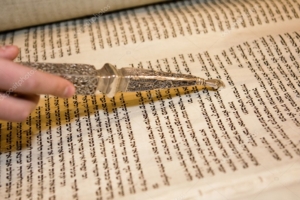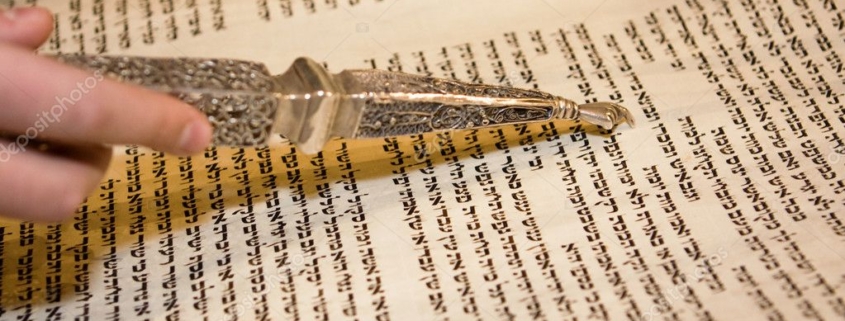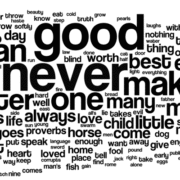Graceful Bar Mitzvah / Graceful Masculinity: Nitzavim
 Part of a periodic Torah series on graceful masculinity and Jewish values.
Part of a periodic Torah series on graceful masculinity and Jewish values.
רְאֵה נָתַתִּי לְפָנֶיךָ הַיּוֹם, אֶת-הַחַיִּים וְאֶת-הַטּוֹב, וְאֶת-הַמָּוֶת, וְאֶת-הָרָע.
See, I set before you this day, life and goodness, death and evil. (Deuteronomy 30:15)
The word “HaYom” is famously understood to be an allusion to Rosh Hashanah – the day that humans were first formed and the birthday of the world where again it is held responsible for its actions. This is also true for “the day” that a Jewish boy is held accountable for his actions as a man. Psalms 2:7, the thirteenth verse in the book, is referencing this day of one’s Bar Mitzvah: אֲסַפְּרָ֗ה אֶֽ֫ל־חֹ֥ק ה’ אָמַ֘ר אֵלַ֥י בְּנִ֥י אַ֑תָּה אֲ֝נִ֗י הַיּ֥וֹם יְלִדְתִּֽיךָ׃ – I declare, as an obligation, that G-d said to me, My son I birthed you today.
An immediate consequence of reaching Jewish adulthood is that one can make new contributions to the spiritual collective. The Medreshcites the Prophet Isaiah”עַם־זוּ֙ יָצַ֣רְתִּ – this nation I formed” as a nod to the shift from just being a person to being part of a people. ”זו – Zu”, the Rabbis point out, also has a numerical value of thirteen. These thirteen years also correspond to the Thirteen Attributes of Mercy. The joy of this day is deeply connected to the power of the covenant of peoplehood י”ג מדו”ת ש”ל רחמי”ם = שמח”ת ב”ר מצו”ה (the joy of the Bar Mitzvah = thirteen Attributes of Mercy), both equalling 1091.
Being obligated in commandments is the Divine expectation of accountability for others. Mitzvah is a language of connectivity and attachment. Saying the Shema and accepting the yoke of heaven is the first Biblical Mitzvah that one is commanded as an adult, and is why it is the subject of the first Mishna in the Talmud. It also opens with the instruction to cleave to the oneness (אחד) of G-d through love (אהבה); both which have a numerical value of thirteen.
This day marks the beginning of the journey, not its completion. Each and every day consists of choices; actions and inactions. Those decisions, to various degrees, bring us closer or further away from our ultimate goal of a perfected and intimate relationship with the Source of All Good. We all want to choose life, but we don’t always realize that the path to get there is paved, in fact, with good deeds.
The Talmud tells the story of the great Rabbi Alexandri who would, like a merchant selling their wares, declare in the street: “מאן בעי חיי מאן בעי חיי – Who wants life? Who wants life?” Folks would gather around shouting “הב לן חיי – Give us life!” to which the Rabbi responded “מי האיש החפץ חיים … Who is the person who desires life …ס֣וּר מֵ֭רָע וַעֲשֵׂה־ט֑וֹב בַּקֵּ֖שׁ שָׁל֣וֹם וְרדְפֵֽהוּ Remove yourself from evil and do good, desire peace and pursue it.” It is accessible to everyone but we must want it. As King David wrote גְּ֭דֹלִים מַעֲשֵׂ֣י ה’ דְּ֝רוּשִׁ֗ים לְכל־חֶפְצֵיהֶֽם, “Great are the deeds of G-d, available to all who want them.”
One way to achieve clarity of direction is to see the benefits that come from the good choices we make. King Solomon wrote about the Torah’s teachings, “My son . . .they will be life to your soul and a graceful [ornament] for your neck.” The Malbim understands this guarantee to be manifested during the study of Torah, in that grace is generated in the pleasantness of the experience both among people and G-d. This is also found in the teaching from Rabbi Chanina ben Dosa who posits that “one with whom people are pleased (chein), G-d is pleased. But anyone from whom people are displeased, G-d is displeased.
It is much easier to prepare for a particular day, than it is to show up and be present every day. Rosh HaShanah is one day but it sets the tone for the whole year. A boy’s bar mitzvah celebration is significant in that it projects an image of the kind of life he chooses to live. It can be difficult to sustain one’s vision across the long experience of time. Finding the sweetness and blessing in the work makes it sustainable.
The Sifrei compares the learning of Torah to the presence of טל Tal-dew: just as the whole world rejoices with dew, so too with the Torah. This can be achieved in seeing the value of the choices we make day in and day out. The word ביום – with the day, equals חן – grace. Seeing ourselves as truly a bar mitzvah, a master of our holy destiny, empowers us to choose the good life – through a life of good deeds.

R. Mike Moskowitz is a founding builder at Bayit and scholar-in-residence at CBST.









